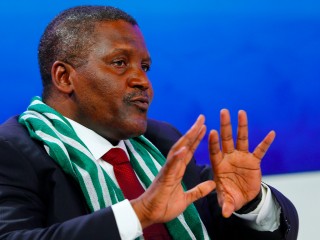On Sunday, the governor of the Central Bank of Nigeria, Godwin Emefiele took a tour of the Dangote refinery, fertiliser and petrochemical complex in Lekki Free Trade Zone Lagos. During his visit, he expressed his readiness to support the facility by providing foreign exchange for the importation of equipment. “If he wants Naira, we will give him Naira at concessionary prices. If he wants dollar to import the equipment, we will give him,” Emefiele said.
This comes at a time when many Nigerian businesses are at a cross road due to inadequate foreign exchange to fund their businesses. However there are several probable reasons why the Central Bank will support Dangote in accessing foreign exchange even after placing strict restrictions for businesses. Below are some of the reasons:
The project
The Dangote refinery, located at the Lekki Free Trade zone, if completed, is set to become the largest single train refinery in the world. The refinery, sited on 2,600 hectares of land will produce gasoline, diesel, aviation fuel/household kerosene, slurry as raw material for carbon black, as well as 750,000 mtpa of polypropylene and fertilizer.
If the $14bn project is completed it would help to lower the country’s dependence on imports, while reviving and transforming the Nigerian economy by making it an exporter of oil.
The stakeholder
Aliko Dangote who is the major shareholder and owner of the refinery, is also the richest man in Africa 2015 according to Forbes with a net worth of $14.7billion. He has topped the list of Africa’s richest men for the past three years. He made his fortune through the importation of cement, flour and sugar.
What Nigeria stands to gain
Dangote in an interview with the BBC’s Focus on Africa programme said that “the refinery would create thousands of jobs.”
The project would help the central bank to conserve foreign exchange, as the country would save about 40 percent of the foreign exchange used currently to import fertilisers, petroleum products and petrochemicals.
Emefiele also told the press during his visit to the facility that the country would also fetch about $6bn in foreign exchange yearly through the export of products from the plants.
For more insight, click to listen to the podcast below








